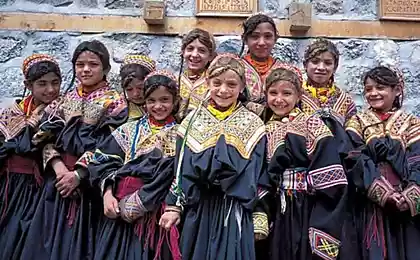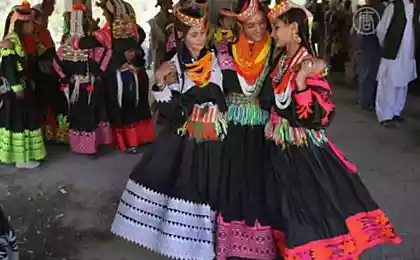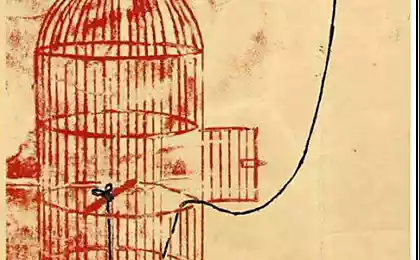4709
Hunza - the people who did not know DISEASES AND lives up to 120 years
Our Earth is a wonderful vegetarian tribe, whose members do not know the disease and has an average life expectancy of 110-120 years. Although, there are also those who passed for 160. They live in northern India in the Himalayas in very harsh conditions, on the River Hunza, 100 kilometers from the northern city of Gilgit India. 40-year-old woman they look like a girl, 60 years old preserve harmony and elegance of the figures, and in 65 years, even having children call themselves hunzakutami.
On his secret to longevity, they simply say: be a vegetarian, and work always physically move constantly, does not change the rhythm of life.
Hunza (Burusho people, hunzakuty) - Indo-European people (now they are little more than twenty thousand. People), who lives in the highlands of Kashmir controlled by Pakistan. Most live in the Hunza River Valley, at an altitude of 2000 meters above sea level. This indescribable beauty of the valley, surrounded by high altitude over 6000 meters, is called Happy. Its inhabitants, including aged over 100 years, working in the field, make long alpine crossings, playing outdoor games.
These beautiful, slender people always cheerful, friendly, quiet, hospitable and cordial, despite the harsh conditions of life. Their home - a tiny stone houses without windows, with one hole for the chimney. Livestock is in the same house, but behind the partition. It is likely that in such close quarters it is warmer, because the house is almost no heating (no wood), and even washed Hunza only cold water. However, in these stone huts they live only 2-3 months of winter, and the rest of the time spend in the open air, where sleep and eat, have children.
At the head of this people are the king and council of elders. They are easy to control their subjects, because in this society, there is no crime, therefore - no police, no prisons. Hospitals also practically unnecessary, because hunzakuty, in contrast to neighboring nations, never boleyut.Oni - the only people on the planet, which is not the case of malignant disease, and even the very old are not suffering from senile dementia and decrepitude.
Interestingly, the other people who live there, do not shine a lot of health and sickness. But, surprisingly, even during the terrible epidemics have not seen a single patient hunzakuta. Hunza differ excellent health, and almost do not know what the disease. Even tooth pain or visual disturbances - things unheard of in these parts - it always seemed improbable. Hunzakuty impresses with its absolutely great, fantastic endurance - is the most tireless guides and porters in the mountains of the Himalayas. Go one day to the market for a hundred kilometers on goat paths and scree they can almost every man ...
The world first learned about them from the stories of Scottish military doctor Mc Karrisona who worked for 14 years in these parts, and then many scientists have spent years studying the phenomenon. As a result, they concluded that the main secret of longevity of these places - a special power system.
One might object: But what an amazing diet is not followed, life in the metropolis has certainly dooms us to illness earlier aging and premature death! A mountain climate - is another matter ...
We think that if a breathe of fresh, oxygen-enriched air, drink clean water, have grown up in a "clean" land of the products, it is not difficult to become centenarians. But how do we explain the fact that the nearest neighbors of Hunza, living under the same climatic conditions, live half, but still constantly sick? ..
What is the cause of absolute health and longevity hunzakutov?
Hunza - PEOPLE-raw foodists.
This nation, however, small (only 15 000), which can be said that he completely unknown illness. This Hunza.
People found this talented military doctor Mc Kerison around the northern border of Kashmir (India).
Mc Kerison closely associated with many neboleyuschimi nations and tribes that live between Tibet, China, Pamirs, Afghanistan and Pakistan today, and during their wanderings in these places once faced with the People of Hunza. He was struck by their beautiful, slim body and high efficiency. Among all healthy Hunza (multiple fractures and inflammation of the eyes).
BASIC PRINCIPLES OF SUPPLY:
1. Meat is allowed to use only on religious holidays. It is important that after the slaughter of cattle it is cooked immediately, not in store zagotavlivaya.
2. Milk and milk must have a rare and moderately.
3. Spirits prohibited. The only exception - wine from local grapes. Drink it should be only on special occasions.
4. Bread - only black. Flour (by the way, is not separated from the bran) can not be stored for long periods, you must immediately use for baking. Part of cereals (barley, millet, wheat, buckwheat), it is desirable to have a germinating.
5. The daily diet should prevail vegetables and fruits and vegetables eaten raw in large quantities, occasionally - in the stew.
6. Most of the diet should be fruits. No compotes and jam! Only fresh fruit!
7. Very moderate salt intake.
Hunza - very poor people. They live in the mountainous terrain, devoid of fertile soil. There are no forests, and every piece of land is occupied with fruit trees. Meadows also not, so every inch of land allotted to vegetables and potatoes. The terrain is different scarcity: it rains rarely - only for three or four winter months when the temperature drops to zero and below. And there is very little snow. Therefore, water - weight in gold. Hunza or use a system of canals, water accumulates in the rain, or deliver water from afar.
Cows out there a little more Saint Bernards, skinny goats and sheep graze on the mountain slopes, covered with stones, milk yield is small (less than two liters a day, and then only immediately after calving), it contains little fat. Sheep and does not give milk, goats - a little. Animal meat stringy and completely skimmed.
In winter Hunza sleep in stone houses without windows (only one hole), Hunza sleep on a stone bench. Livestock "housed" in the hallways. Naturally, they do not have firewood. Fire in the hearth is supported by dry twigs and leaves. On such a fire cook food; wash and wash clothes in cold water only. No animal fats, no olives for oil. Bypassing Hunza without baths, no hot water and no soap. And, as you can see from all this, they may not be enough food, even herbal.
In the winter months, people are "vegetative" lifestyle, eating meager stocks of cereals (just beans) and dried apricots, and in the spring they go to grass, using herbs and vegetables before first harvest. In summer mostly eat apricots and other fruits. Hunza are illiterate. Only members of the noblest families of the king and his entourage, who studied in Muslim religious schools, can read and write. They have no poetry in their language, nor sculpture, nor painting, nor woodcarving, they do not know the skill of weaving, which is owned by their neighbors. Family of musicians belong to a different tribe.
During the warmer months 8-10 Hunza live outdoors. It is considered axiomatic that marriage between close relatives are harmful, that they affect the physical and mental health of each individual. Meanwhile, representatives of the people marry only with members of their small nation. Another's blood is not flowing in their veins. The only exception is the royal family.
And yet, in spite of all and against all odds, Hunza have enviable zdorovem.Soglasno sound science, Hunza - it's the only healthy and happy people in the world.
The reason for this lies in the nature of health food -polnotsennom, natural and free of harmful contaminants. Their food, though scanty, is fully consistent with the physiological needs of the human body. Such food can be only natural berries, fruits, vegetables, herbs, nuts, edible roots.
What is meant by the expression "full health»?
It is determined by three aspects:
1) high capacity for work in a broad sense. In Hunza this manifests as the ability to work at work, and during the dances and games. For them to go 100 - 200 miles - is like for us to take a short walk around the house. They are extremely easy to climb the steep mountains to pass some news, and return home a fresh and funny;
2) cheerfulness. Hunza constantly laughing, they are always in a good mood, even when hungry and suffering from the cold;
3) exceptional durability. "We Hunza nerves strong as ropes, and thin and delicate, like a string - wrote Mc Kerison. - They never get angry and do not complain, do not get nervous and do not show impatience, not quarrel among themselves and with complete peace of mind to endure physical pain, trouble, noise and so on. N. »
The experience of Mac Kerisona that science is known as "Experiment Kennels" - the location of his laboratory. The researchers divided thousands of experimental rats into three groups according to three groups: "Whitechapel" (London area), "Hunza" and "Indians." All of them were kept in the same conditions, but a group of "Whitechapel" receives food that consume the inhabitants of London (Vol. E. The one that Europeans eat) - white bread, white flour products, jam, meat, salt, canned food, eggs, sweets, boiled vegetables, and so on. n. Krysy- "Hunza" received the same food as the people of this tribe. Krysy- "Indians" -pischu inherent Hindus and people of the East. Mc Kerison examined the health status of an entire generation, get three different diets, and discovered an interesting pattern.
Animals from group "Whitechapel" had been ill all the diseases that affect the residents of London, from childhood diseases and ending chronic and age-related illnesses. This group was quite nervous and belligerent, rat bite each other, and even bite to death "compatriots" to death.
Krysy- "Indians" for health and general behavior were similar to people who embody in this experiment.
A krysy- "Hunza" stay healthy and cheerful, spent time in games and relaxing holiday.
What can be learned from these observations ??
1. First of all, neither the climate nor religion, nor customs, nor the race did not have a noticeable effect on health - has meaning only food.
2. Food, and not anything else can turn healthy people into patients, enough to remove from the diet of certain substances that are considered, in the opinion of most people, unimportant, t. E. The enzymes, amino acids, vitamins, minerals, fatty acids, which are only in the plant world and that benefit only when they are used in its natural form.
3. The amount of food and its high energy value, t. E. The caloric content, have no health in any way. Important part of the food.
4. Even the moral state of the individual may suffer if the diet lacks certain nutrients.
Rats that lived in peace and friendship among themselves, become aggressive and devouring each other, when they were deprived of wholesome food necessary for health. This indicates that any social unrest, revolution, war, malnutrition depend on people.
Not correspond to the nature of human food, not her fault, as claimed by politicians, to blame for the poor state of society.
Thus, the quality of the food, its composition, quantity, route of administration, and combinations affect the preservation of health, safeguard against diseases, preserve youthfulness.
From the quality of food depends on mental health, emotional balance, lack of neurosis and mental disorders.
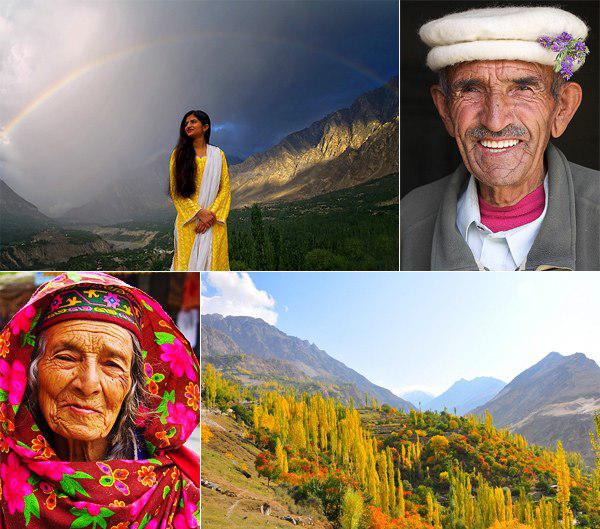
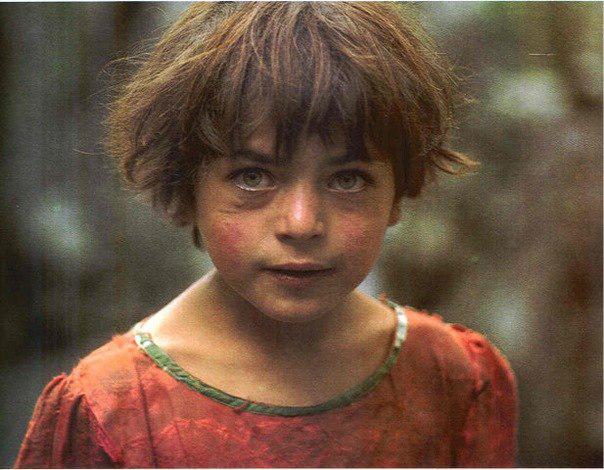
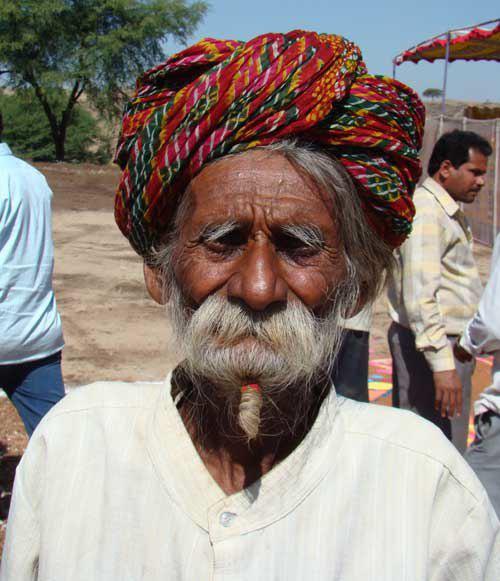
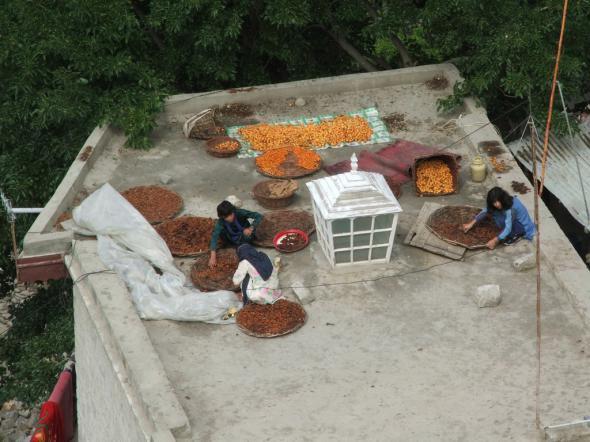
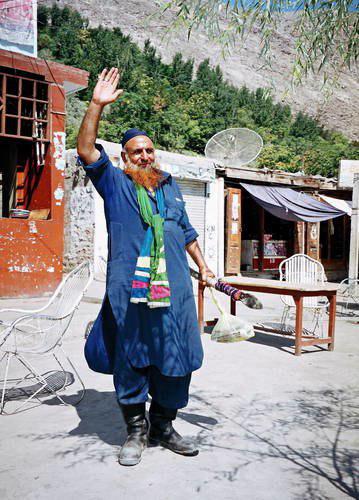
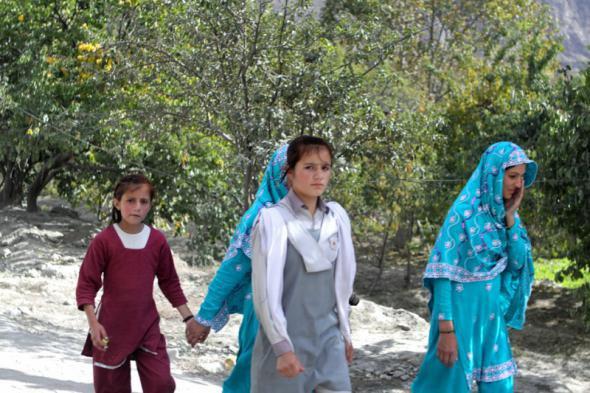
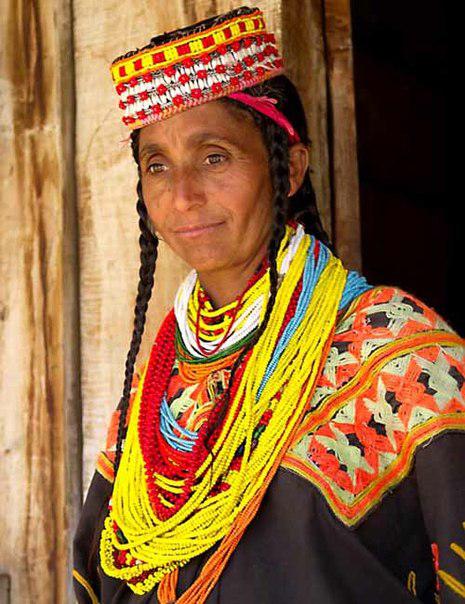
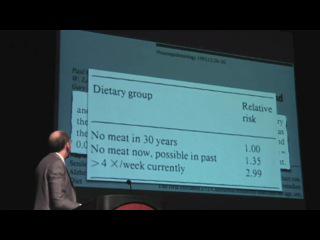

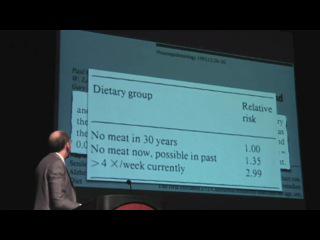

On his secret to longevity, they simply say: be a vegetarian, and work always physically move constantly, does not change the rhythm of life.
Hunza (Burusho people, hunzakuty) - Indo-European people (now they are little more than twenty thousand. People), who lives in the highlands of Kashmir controlled by Pakistan. Most live in the Hunza River Valley, at an altitude of 2000 meters above sea level. This indescribable beauty of the valley, surrounded by high altitude over 6000 meters, is called Happy. Its inhabitants, including aged over 100 years, working in the field, make long alpine crossings, playing outdoor games.
These beautiful, slender people always cheerful, friendly, quiet, hospitable and cordial, despite the harsh conditions of life. Their home - a tiny stone houses without windows, with one hole for the chimney. Livestock is in the same house, but behind the partition. It is likely that in such close quarters it is warmer, because the house is almost no heating (no wood), and even washed Hunza only cold water. However, in these stone huts they live only 2-3 months of winter, and the rest of the time spend in the open air, where sleep and eat, have children.
At the head of this people are the king and council of elders. They are easy to control their subjects, because in this society, there is no crime, therefore - no police, no prisons. Hospitals also practically unnecessary, because hunzakuty, in contrast to neighboring nations, never boleyut.Oni - the only people on the planet, which is not the case of malignant disease, and even the very old are not suffering from senile dementia and decrepitude.
Interestingly, the other people who live there, do not shine a lot of health and sickness. But, surprisingly, even during the terrible epidemics have not seen a single patient hunzakuta. Hunza differ excellent health, and almost do not know what the disease. Even tooth pain or visual disturbances - things unheard of in these parts - it always seemed improbable. Hunzakuty impresses with its absolutely great, fantastic endurance - is the most tireless guides and porters in the mountains of the Himalayas. Go one day to the market for a hundred kilometers on goat paths and scree they can almost every man ...
The world first learned about them from the stories of Scottish military doctor Mc Karrisona who worked for 14 years in these parts, and then many scientists have spent years studying the phenomenon. As a result, they concluded that the main secret of longevity of these places - a special power system.
One might object: But what an amazing diet is not followed, life in the metropolis has certainly dooms us to illness earlier aging and premature death! A mountain climate - is another matter ...
We think that if a breathe of fresh, oxygen-enriched air, drink clean water, have grown up in a "clean" land of the products, it is not difficult to become centenarians. But how do we explain the fact that the nearest neighbors of Hunza, living under the same climatic conditions, live half, but still constantly sick? ..
What is the cause of absolute health and longevity hunzakutov?
Hunza - PEOPLE-raw foodists.
This nation, however, small (only 15 000), which can be said that he completely unknown illness. This Hunza.
People found this talented military doctor Mc Kerison around the northern border of Kashmir (India).
Mc Kerison closely associated with many neboleyuschimi nations and tribes that live between Tibet, China, Pamirs, Afghanistan and Pakistan today, and during their wanderings in these places once faced with the People of Hunza. He was struck by their beautiful, slim body and high efficiency. Among all healthy Hunza (multiple fractures and inflammation of the eyes).
BASIC PRINCIPLES OF SUPPLY:
1. Meat is allowed to use only on religious holidays. It is important that after the slaughter of cattle it is cooked immediately, not in store zagotavlivaya.
2. Milk and milk must have a rare and moderately.
3. Spirits prohibited. The only exception - wine from local grapes. Drink it should be only on special occasions.
4. Bread - only black. Flour (by the way, is not separated from the bran) can not be stored for long periods, you must immediately use for baking. Part of cereals (barley, millet, wheat, buckwheat), it is desirable to have a germinating.
5. The daily diet should prevail vegetables and fruits and vegetables eaten raw in large quantities, occasionally - in the stew.
6. Most of the diet should be fruits. No compotes and jam! Only fresh fruit!
7. Very moderate salt intake.
Hunza - very poor people. They live in the mountainous terrain, devoid of fertile soil. There are no forests, and every piece of land is occupied with fruit trees. Meadows also not, so every inch of land allotted to vegetables and potatoes. The terrain is different scarcity: it rains rarely - only for three or four winter months when the temperature drops to zero and below. And there is very little snow. Therefore, water - weight in gold. Hunza or use a system of canals, water accumulates in the rain, or deliver water from afar.
Cows out there a little more Saint Bernards, skinny goats and sheep graze on the mountain slopes, covered with stones, milk yield is small (less than two liters a day, and then only immediately after calving), it contains little fat. Sheep and does not give milk, goats - a little. Animal meat stringy and completely skimmed.
In winter Hunza sleep in stone houses without windows (only one hole), Hunza sleep on a stone bench. Livestock "housed" in the hallways. Naturally, they do not have firewood. Fire in the hearth is supported by dry twigs and leaves. On such a fire cook food; wash and wash clothes in cold water only. No animal fats, no olives for oil. Bypassing Hunza without baths, no hot water and no soap. And, as you can see from all this, they may not be enough food, even herbal.
In the winter months, people are "vegetative" lifestyle, eating meager stocks of cereals (just beans) and dried apricots, and in the spring they go to grass, using herbs and vegetables before first harvest. In summer mostly eat apricots and other fruits. Hunza are illiterate. Only members of the noblest families of the king and his entourage, who studied in Muslim religious schools, can read and write. They have no poetry in their language, nor sculpture, nor painting, nor woodcarving, they do not know the skill of weaving, which is owned by their neighbors. Family of musicians belong to a different tribe.
During the warmer months 8-10 Hunza live outdoors. It is considered axiomatic that marriage between close relatives are harmful, that they affect the physical and mental health of each individual. Meanwhile, representatives of the people marry only with members of their small nation. Another's blood is not flowing in their veins. The only exception is the royal family.
And yet, in spite of all and against all odds, Hunza have enviable zdorovem.Soglasno sound science, Hunza - it's the only healthy and happy people in the world.
The reason for this lies in the nature of health food -polnotsennom, natural and free of harmful contaminants. Their food, though scanty, is fully consistent with the physiological needs of the human body. Such food can be only natural berries, fruits, vegetables, herbs, nuts, edible roots.
What is meant by the expression "full health»?
It is determined by three aspects:
1) high capacity for work in a broad sense. In Hunza this manifests as the ability to work at work, and during the dances and games. For them to go 100 - 200 miles - is like for us to take a short walk around the house. They are extremely easy to climb the steep mountains to pass some news, and return home a fresh and funny;
2) cheerfulness. Hunza constantly laughing, they are always in a good mood, even when hungry and suffering from the cold;
3) exceptional durability. "We Hunza nerves strong as ropes, and thin and delicate, like a string - wrote Mc Kerison. - They never get angry and do not complain, do not get nervous and do not show impatience, not quarrel among themselves and with complete peace of mind to endure physical pain, trouble, noise and so on. N. »
The experience of Mac Kerisona that science is known as "Experiment Kennels" - the location of his laboratory. The researchers divided thousands of experimental rats into three groups according to three groups: "Whitechapel" (London area), "Hunza" and "Indians." All of them were kept in the same conditions, but a group of "Whitechapel" receives food that consume the inhabitants of London (Vol. E. The one that Europeans eat) - white bread, white flour products, jam, meat, salt, canned food, eggs, sweets, boiled vegetables, and so on. n. Krysy- "Hunza" received the same food as the people of this tribe. Krysy- "Indians" -pischu inherent Hindus and people of the East. Mc Kerison examined the health status of an entire generation, get three different diets, and discovered an interesting pattern.
Animals from group "Whitechapel" had been ill all the diseases that affect the residents of London, from childhood diseases and ending chronic and age-related illnesses. This group was quite nervous and belligerent, rat bite each other, and even bite to death "compatriots" to death.
Krysy- "Indians" for health and general behavior were similar to people who embody in this experiment.
A krysy- "Hunza" stay healthy and cheerful, spent time in games and relaxing holiday.
What can be learned from these observations ??
1. First of all, neither the climate nor religion, nor customs, nor the race did not have a noticeable effect on health - has meaning only food.
2. Food, and not anything else can turn healthy people into patients, enough to remove from the diet of certain substances that are considered, in the opinion of most people, unimportant, t. E. The enzymes, amino acids, vitamins, minerals, fatty acids, which are only in the plant world and that benefit only when they are used in its natural form.
3. The amount of food and its high energy value, t. E. The caloric content, have no health in any way. Important part of the food.
4. Even the moral state of the individual may suffer if the diet lacks certain nutrients.
Rats that lived in peace and friendship among themselves, become aggressive and devouring each other, when they were deprived of wholesome food necessary for health. This indicates that any social unrest, revolution, war, malnutrition depend on people.
Not correspond to the nature of human food, not her fault, as claimed by politicians, to blame for the poor state of society.
Thus, the quality of the food, its composition, quantity, route of administration, and combinations affect the preservation of health, safeguard against diseases, preserve youthfulness.
From the quality of food depends on mental health, emotional balance, lack of neurosis and mental disorders.












